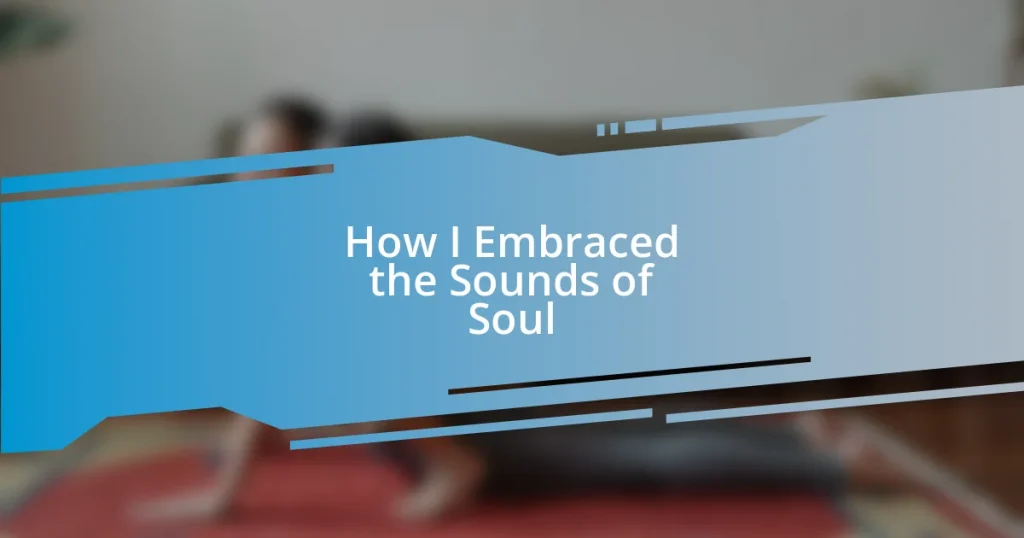Key takeaways:
- Soul music emerged in the 1950s-1960s, blending gospel, rhythm and blues, and jazz, serving as a powerful voice for the African American community during the civil rights movement.
- Key characteristics of soul music include emotional depth, raw vulnerability, and a rich blend of instrumentation, often featuring call-and-response techniques that foster community connection.
- Incorporating soul into daily life can enhance emotional well-being, and creating personalized playlists reflects individual experiences while bridging generational gaps through shared musical moments.
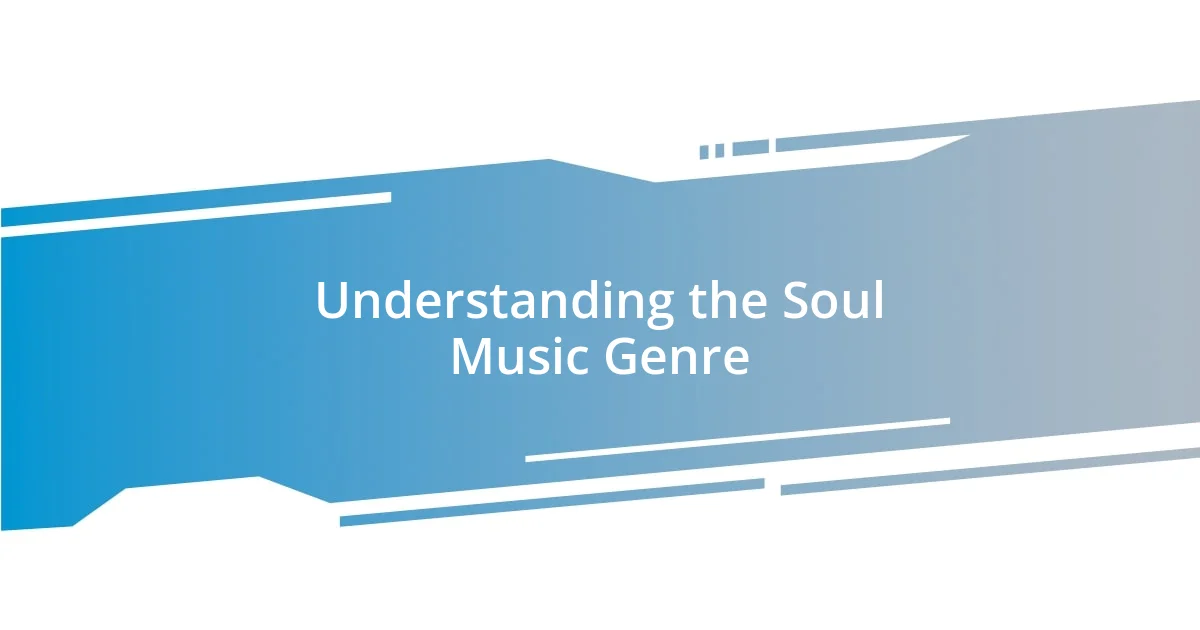
Understanding the Soul Music Genre
Soul music is a genre that emerged in the 1950s and 1960s, blending elements of gospel, rhythm and blues, and jazz. I remember the first time I heard Ray Charles play; it felt like a direct line to the heart. His voice, loaded with raw emotion, made me wonder—how can music be so powerful?
What truly sets soul music apart is its deep emotional connection. It’s like each note has a story and every lyric possesses a yearning that resonates with listeners. I often find myself swaying to Aretha Franklin’s “Respect” and feel empowered. Have you ever noticed how a single song can lift your spirits or transport you to another time and place?
The instrumentation in soul music is also vital, typically featuring rich brass sections, emotive guitars, and smooth basslines. Each element works in harmony to create a sound that’s unmistakably soulful. I can still visualize dancing at a friend’s wedding when a classic Sam Cooke track came on; the entire room lit up as the grooves pulled everyone together. This genre evokes a sense of community that’s hard to find.
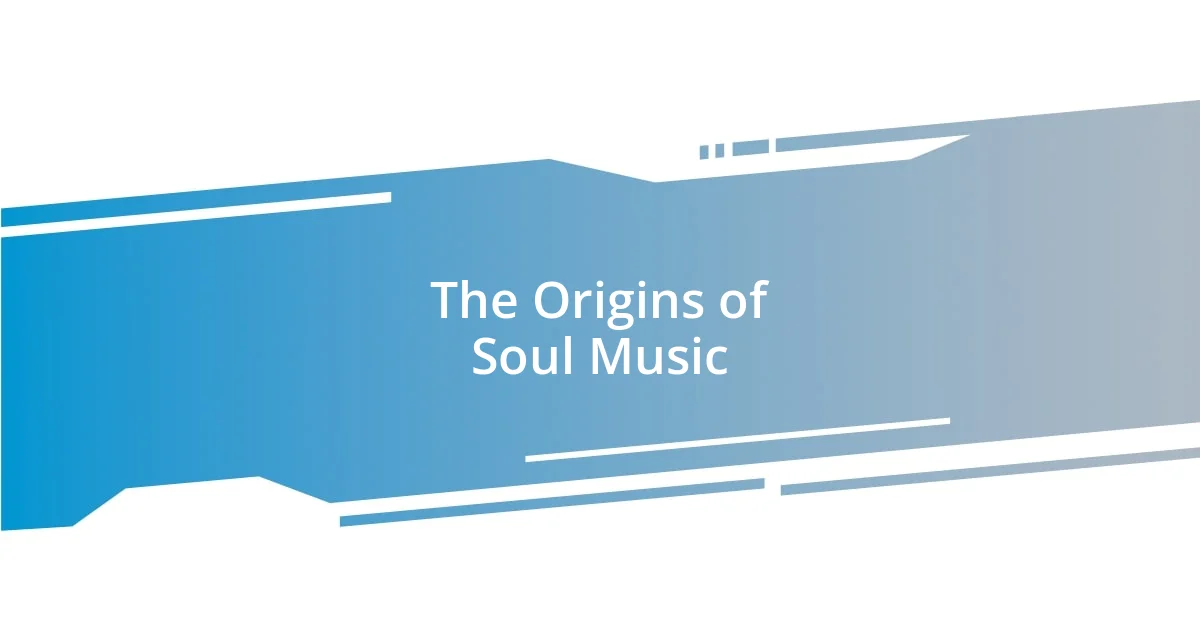
The Origins of Soul Music
The roots of soul music can be traced back to the vibrant communities of African American musicians in the United States. The fusion of gospel’s impassioned vocals, rhythm and blues’ infectious grooves, and jazz’s intricate melodies created a sound that was both new and deeply familiar. I remember listening to Sam Cooke’s “A Change is Gonna Come” for the first time—its combination of hope and heartache struck a chord within me that I still feel today.
During the civil rights movement, soul music became a powerful voice for change, mirroring the struggles and aspirations of the African American community. It wasn’t just music; it was a form of expression that captured the zeitgeist of a generation. I often think back to discussions with friends about how songs like Marvin Gaye’s “What’s Going On” feel timeless, as they still resonate in today’s socio-political landscape.
Soul music stirred emotions unlike any other genre, and artists conveyed raw feelings through their performances. I vividly recall hearing Etta James’s “At Last” at a family gathering, and how it enveloped everyone in warmth and nostalgia. That night taught me that soul music transcends time—it brings people together, no matter when or where they hear it.
| Key Element | Details |
|---|---|
| Origin Influences | Gospel, R&B, Jazz |
| Historical Context | Emerging during the 1950s-1960s civil rights movement |
| Core Emotional Themes | Love, Struggle, Hope |

Iconic Soul Artists to Discover
When diving into the world of soul music, discovering iconic artists can be a transformative experience. Each of these musicians has a unique story that resonates deeply with listeners. I’ll never forget the spark of joy I felt when I first stumbled upon the powerful voice of Otis Redding. His track “Sittin’ On The Dock of the Bay” transports me to a serene place every time I hear it.
Here are a few legendary soul artists you should explore:
- Aretha Franklin: Known as the “Queen of Soul,” her powerful vocals on hits like “Chain of Fools” are simply unforgettable.
- James Brown: The “Godfather of Soul,” his energetic performances and hits like “I Got You (I Feel Good)” are pure joy.
- Sam Cooke: With songs like “You Send Me,” he brought a smooth elegance that makes his music timeless.
- Marvin Gaye: His smooth voice and social messages in songs like “Sexual Healing” and “What’s Going On” resonate across generations.
- Etta James: The sultry vibes of “I’d Rather Go Blind” still give me chills, showcasing her emotional depth and talent.
Each artist brings something special to the table, and I encourage you to lose yourself in their sounds. You might just find a new favorite track that speaks to your heart!
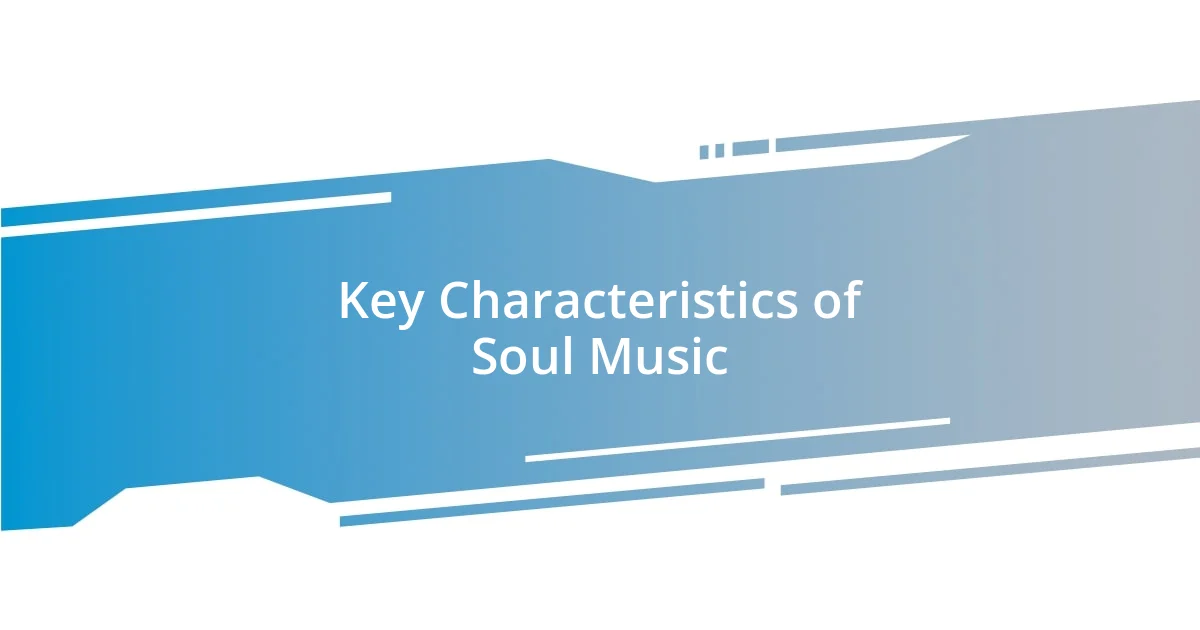
Key Characteristics of Soul Music
The hallmark of soul music lies in its emotional depth and raw vulnerability. When I first listened to Al Green’s “Let’s Stay Together,” I was struck by the tender passion he poured into his singing. It made me wonder—how can a song convey so much feeling? It’s in the way the artists infuse their personal stories, drawing listeners in with every note.
Instrumentation is another defining element of soul. I still recall the first time I heard a brass section in a Marvin Gaye track; it added such a vibrant layer that uplifted the entire song. The blend of horns, strings, and rhythm, often punctuated by a driving beat, transforms soul music into a rich tapestry of sound. Each instrument echoes the powerful emotions conveyed through the vocals, making every performance truly unforgettable.
Additionally, soul music often incorporates call-and-response patterns, a technique rooted in African American musical traditions. I remember feeling a rush when I joined friends at a concert, singing back to the performers in unison. It created an immediate connection, turning a simple song into a collective experience. This interaction not only engages the audience but also allows us to be part of something larger—an echo of the communal spirit that defines soul music.
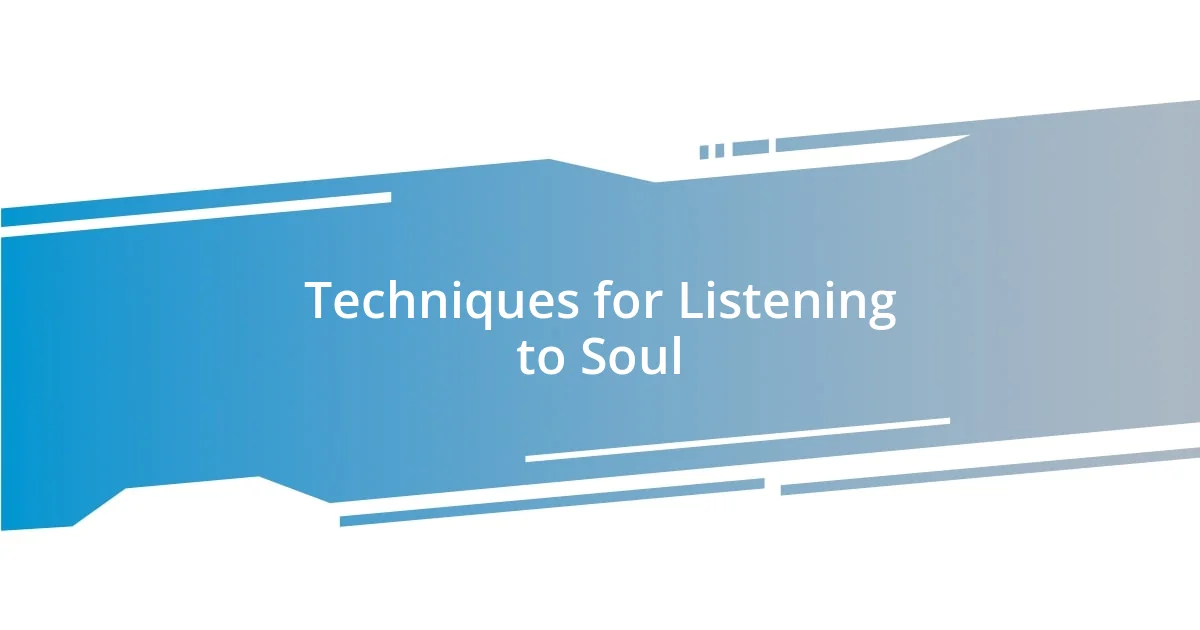
Techniques for Listening to Soul
Listening to soul music isn’t just about the sound; it’s an immersive experience. One technique I’ve found incredibly effective is to create a dedicated listening space. I remember rearranging my room one rainy afternoon, dimming the lights, and just letting the music wash over me. This environment allowed me to focus, almost feeling each note wrap around me, pulling me deeper into the emotional layers of the songs. Have you ever tried setting a mood specifically for music? It can transform the way you connect with what you’re hearing.
Another approach is to follow the lyrics closely. I often take time to pause a track and really absorb the words. When I first listened to “A Change Is Gonna Come” by Sam Cooke, I was struck by the struggle and hope woven into the lyrics. It made me reflect on my own life experiences. By understanding the story behind the music, I found a deeper appreciation for the artist’s message. How often do we listen without truly hearing the words? Engaging with lyrics can add a profound layer of meaning to our experience.
Lastly, I encourage you to share your listening journey with friends. One evening, I organized a soul music night with friends, bringing together our favorite tracks and memories associated with them. We swapped stories about what each song meant to us. This shared exploration allowed us not only to appreciate the music but also to bond over our personal narratives. How do you think conversations about music can enrich your understanding of it? These moments have a unique way of deepening our connection to the sounds and the artists behind them.

Incorporating Soul into Your Life
Incorporating soul into your life can be as simple as letting the music become a part of your daily routine. For me, after a long day, playing a soulful ballad like “At Last” by Etta James transforms my home into a sanctuary. I can’t help but feel a sense of calm wash over me as her voice envelops the space. Have you ever noticed how certain songs can shift your mood, almost like magic?
Another way to embrace soul is by connecting with the rhythms inherent in your own life. I often find myself moving through my chores to the beat of James Brown, letting the music guide my movements. Each task becomes a celebration rather than a chore. How do you infuse joy into your daily activities? Recognizing the groove in the mundane can turn routine into rhythm.
Finally, sharing soul music experiences with others is a powerful way to deepen its impact. I recall a heartwarming afternoon where I introduced my grandmother to my favorite soul tracks. Watching her light up as we reminisced about the old days, singing along to classic hits, was profoundly rewarding. It made me realize that soul music is more than just sound; it’s a bridge connecting generations. What memories could you create by sharing your own musical journey?

Creating Your Own Soul Playlist
Creating a soul playlist is an intimate journey that reflects your personal experiences and emotions. I vividly remember the thrill of curating my first playlist, focused on themes of love and resilience. As I sifted through countless songs, each selection felt like a small piece of my heart, capturing moments I’ve lived through. Have you ever noticed how a melody can transport you back to a significant moment in your life?
In building your playlist, it’s crucial to balance classics with fresh finds. I often blend timeless tracks like “Respect” by Aretha Franklin with contemporary gems like Leon Bridges’ “Coming Home.” This mix not only keeps things interesting but also highlights the evolution of soul music. Have you ever played around with mixing different eras? It’s fascinating to see how songs can resonate across generations, weaving a rich tapestry of sound and emotion.
Lastly, don’t shy away from adding a personal touch. I’ve included interludes of spoken word or even snippets of my own thoughts that resonate with the themes of the songs. This added layer makes the playlist feel uniquely mine. How do you think personal reflections can enhance your listening experience? When your playlist tells your story, it becomes not just a collection of songs, but a soundtrack to your life.











